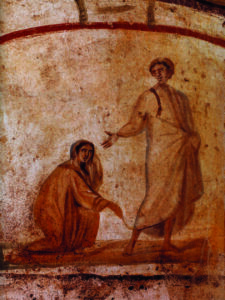Jesus Heals the Bleeding Woman
 Today in the Gospel (cf. Mark 5:21-43) Jesus encounters our two most dramatic situations, death and disease. However, in this period in which illness is still at the centre of the news, we will focus on the healing of the woman. More than her health, her affections were compromised. Why? She had blood loss and therefore, according to the mindset of the time, she was deemed impure. She was a marginalised woman; she could not have stable relationships; she could not have a husband; she could not have a family, and could not have normal social relationships, because she had an illness that rendered her ‘impure.’ She lived alone, with a wounded heart. What is the greatest illness of life? Tuberculosis? The pandemic? No. The greatest illness of life is a lack of love; it is not being able to love. This poor woman was sick, yes, with blood loss, but as a result, with a lack of love, because she could not be with others socially. And the healing that counts the most is that of the affections.
Today in the Gospel (cf. Mark 5:21-43) Jesus encounters our two most dramatic situations, death and disease. However, in this period in which illness is still at the centre of the news, we will focus on the healing of the woman. More than her health, her affections were compromised. Why? She had blood loss and therefore, according to the mindset of the time, she was deemed impure. She was a marginalised woman; she could not have stable relationships; she could not have a husband; she could not have a family, and could not have normal social relationships, because she had an illness that rendered her ‘impure.’ She lived alone, with a wounded heart. What is the greatest illness of life? Tuberculosis? The pandemic? No. The greatest illness of life is a lack of love; it is not being able to love. This poor woman was sick, yes, with blood loss, but as a result, with a lack of love, because she could not be with others socially. And the healing that counts the most is that of the affections.
The story of this woman – in whom we can all see ourselves, is exemplary. The text says that she had tried many treatments, “had spent all that she had, and was no better but rather grew worse” (v. 26). We too, how often do we throw ourselves into mistaken remedies to sate our lack of love? We think that success and money make us happy, but love cannot be bought; it is free. We hide in the virtual, but love is tangible. We do not accept ourselves as we are and we hide behind external facades, but love is not an appearance.
At times we are content to repeat prayers - many times, like parrots
We look for solutions from magicians and from gurus, to then find ourselves without money and without peace, like that woman. Finally, she chooses Jesus and throws herself into the crowd to touch Jesus’ garment. In other words, that woman seeks direct contact, physical contact with Jesus. Especially in this time, we understand how important contact and relationships are. The same counts with Jesus: at times we are content to observe some precepts and to repeat prayers – many times, like parrots – but the Lord waits for us to encounter him, to open our hearts to him, for us, like the woman, to touch his garment in order to heal. Because, by becoming intimate with Jesus, we are healed in our affections.

Christ healing a bleeding woman, as depicted in the Catacombs of Marcellinus and Peter.
Jesus wants this. In fact, we read that, even while pressed by the crowd, he looks around to find who touched him. The disciples were saying: “But you see the crowd pressing around you…”. No: “Who touched me?” This is Jesus’ gaze: there are many people, but he goes in search of a face and a heart full of faith. Jesus does not look at the whole, like we do, but he looks at the individual. He does not stop at the wounds and mistakes of the past, but goes beyond sins and prejudices. We all have a history, and each of us, in our secret memories, knows well the ugly matters of our history. But Jesus looks at it in order to heal it. Jesus goes beyond sins. Jesus goes beyond prejudices. Jesus does not stop at appearances, but reaches the heart. And he heals precisely her, who had been rejected by everyone, an impure woman. He tenderly calls her “daughter” (v. 34) – Jesus’ style was closeness, compassion and tenderness: “Daughter…” – and he praises her faith, restoring her self-confidence.
Sister, brother, you are here, let Jesus look at and heal your heart. I too have to do this: let Jesus look at my heart and heal it. And if you have already felt his tender gaze upon you, imitate him, and do as he does. Look around: you will see that many people who live beside you feel wounded and alone; they need to feel loved. Take the step. Jesus asks you for a gaze that does not stop at the outward appearance, but that goes to the heart: a gaze not judgemental, but welcoming – let us stop judging others – Jesus asks us for a non- judgemental gaze. Because love alone heals life.
Angelus Address, Sunday 27 June 2021
 Entries(RSS)
Entries(RSS)